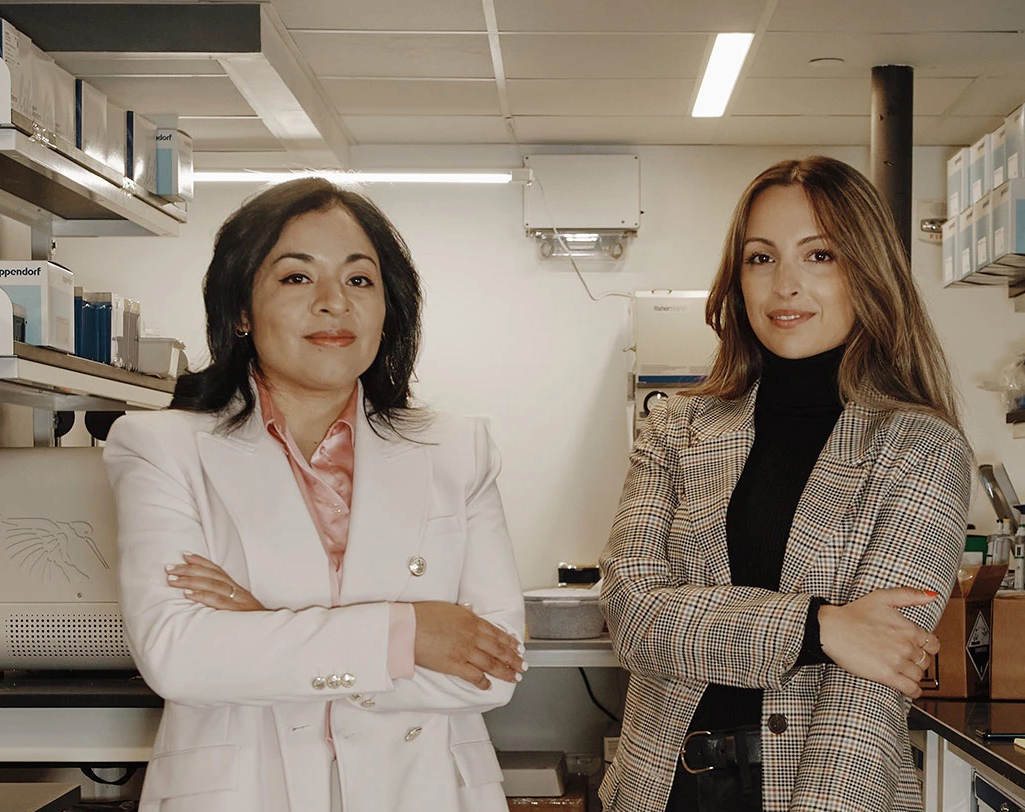
Biobot Analytics uses molecular technologies and AI to analyze sewage for SARS-CoV-2 nationwide. Their data, generated from over 700 sites representing more than 100 million people, gives governments and businesses the tools they need to focus public health efforts and improve lives in the communities they serve.
The Biobot Analytics Story
Iran-born Canadian Newsha Ghaeli, president and cofounder of Biobot Analytics, has spent years exploring applications for technology in urban systems in order to build more resilient cities. While working at the MIT Senseable Cities Lab, Ghaeli met Mariana Matus, a PhD student in computational and systems biology. Drawing from different disciplinary backgrounds, Ghaeli began working with Matus on a data systems project which aimed to answer the questions: Can we look at sewage as being similar to our gut? Can we look at sewage as offering a wealth of information on the health of a community? Ghaeli and Matus worked for years on the project before meeting Hyperplane in 2016 at an MIT startup competition, after which, with the help of the Hyperplane team, Biobot Analytics took shape.
Biobot initially set out to bring more real-time data to local communities tackling the opioid crisis. After COVID hit, the company began to use their technology to understand the true scope of disease incidents within urban communities. Within a few weeks of the pandemic’s onset, the company devised a system to analyze SARS-CoV-2 in wastewater, which was then deployed in hundreds of cities across the country. Biobot has since launched even more applications, relaunched their opioid and high-risk substances work, and responded to the Monkeypox outbreak over the summer of 2022. Biobot has become the first company in the world to commercialize data from sewage.
"If you’re finding that other people are willing to bet on you and your ideas, take that seriously."

Q&A
How has Hyperplane benefitted you as you handled this rapid scale?
As a co-founder and as an executive, my role is constantly changing. How I can best serve or contribute to the company looks different every 4 to 6 months. Being amenable to that change is one thing, but also being able to take a step back to even identify how I need to change to better serve the company is also a challenge.
What's been great about the Hyperplane team is that they're always there to talk through any of these big challenges. They're extremely founder-friendly and supportive. It's not so much about telling us what to do, but rather helping us get to where we need to get to and helping us grow as individuals.
I've always felt comfortable working with Hyperplane, who helps us see that we are in the best position to lead this company. They have helped me see that it's just a matter of making the changes that I need to make to be the best leader for the company today, and these might be different than those necessary for yesterday and tomorrow.
Where has Hyperplane been most helpful?
They've always been a really big help when it comes to fundraising and helping navigate the investor community. Even though we’re past the seed round, they're just a phone call away to help think through strategies. My co-founder Mariana leads fundraising, and they're always willing to help no matter what.
They’ve also been incredibly helpful in introducing us to top talent. Hyperplane obviously has an incredible network of founders, former founders, and top-performing individuals from former companies or portfolio companies of theirs. That's been another facet that I always know we can rely on them for.
They’ve also been incredibly helpful in introducing us to top talent. Hyperplane obviously has an incredible network of founders, former founders, and top-performing individuals from former companies or portfolio companies of theirs. That's been another facet that I always know we can rely on them for.
How is Hyperplane different from other investors?
The very, very early support that we got from Hyperplane was transformational in giving us, or at least me as an individual and a founder, the confidence to actually take a leap to start this company. It's one thing to go through competitions within an academic environment and win prizes versus saying, "You know what? I'm actually going to incorporate this business."
I think the fact that they stepped up, basically as soon as we were on the cusp of leaving MIT, and just said, "We want to be the first check in this company," really gave me that confidence and safety net in a way that gave me the push to be like: "Let's do it. Let's actually do this.”
What advice would you give to other founders?
If you’re finding that other people are willing to bet on you and your ideas, take that seriously. Use that to fuel your own confidence in yourself. Even if, as you're thinking of starting a company, it's something you've never done before. If you’re like me and don't have a background in business, when you have folks that are telling you around you, "Hey, you should do this, this is really awesome. You guys can really build something here," turn that into fuel to get you to where you need to be. There’s a lot of people that want to see you succeed. You can really build that great community around you, one that is rooting for you in your corner.
